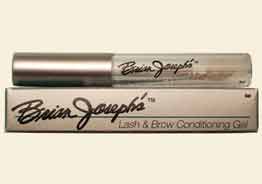Paper: The Kansas City Star
Author: KAREN UHLENHUTH
Date: December 2, 1996
Section: FYI Page: E1
Copyright 1996, The Kansas City Star Co.
Message: Losing hair, gaining a friend Cancer patients find confidence in local wig creator Patty Turkal
Losing hair, gaining a friend
All too often, the sequence of events goes like this: the diagnosis, the surgery, the chemotherapy, the Zsa Zsa Gabor wig. Patty Turkal knows just how bad a bad wig can be - especially for someone trying to come back from cancer. In her little Overland Park shop, discreetly named Brian Joseph's (after her grandson) and discreetly located in a single-story commercial building on a quiet side street, Turkal helps cancer patients keep their dignity, their looks and their hope after they've lost their hair.
She sells a line of wigs - medical hair prostheses, she calls them - that she developed specifically for bald people. Their linings don't scratch. They fit more securely than many, thanks to several strategically-placed adhesive patches. And they don't make the wearers look anything like Zsa Zsa - unless they want to, that is.
Also for sale are breast prostheses, eyelashes and a shampoo created specially for bald cancer patients by Turkal and a chemist who was afflicted with brain cancer.
Every bit as important as what she sells, however, is what Turkal has to say to her clients, many of whom are still reeling from the bad news delivered perhaps just days before their first meeting with her.
"When you're there saying, 'I'm going to get well,' she's there saying, 'Of course you are,' '' said Jane Mobley, a businesswoman from Fairway who was diagnosed and treated last spring for ovarian cancer.
Turkal knows. A decade after she had perfected her chemotherapy wig, she had need of it herself.
Late in 1991, she went to her physician for the yearly assessment of her multiple sclerosis, diagnosed in 1988. When the doctor called her with her test results and the news that she had breast cancer, she told him, "You must have the wrong film; I have MS.'' "You have that too,'' he said.
She had a mastectomy, followed by her first chemotherapy treatment Dec. 2. When, three weeks later, she still had all of her hair, she figured she'd be one of the lucky ones.
Her fortunes turned on the afternoon of Dec. 24, when she stepped into the shower to get ready for a holiday dinner with her family.
She wet her head, rubbed some shampoo into it - and her hair came out. All of it.
She drove to her shop, picked out a wig that replicated her hair and went on to dinner.
"I wore that wig for 14 months straight. No one in my family knew I was wearing a wig. '' Turkal, who has been cancer-free for five years, knows what her clients are going through. And she knows what they need to hear. Even after they've taken home their hairpieces, many of them come back for the comfort and the wisdom of one who's been to the edge and back.
"She has this upbeat attitude that is not overly perky,'' Mobley said. "She's truthful. She gives you reality orientation, but it's so hopeful. I come away thinking, I will be well. I will have hair."
My hair will be beautiful. "The day my eyebrows fell out ... I would have burst into tears except that Patty had said, 'One day you will have no eyebrows and no eyelashes, and here's what you do. '' Turkal then showed her how to draw in her own.
"She's so good at being supportive to them,'' said Mary Moody, a social worker who counsels cancer patients at the University of Kansas Medical Center. Although several other local businesses and nonprofit agencies provide hair prostheses to cancer patients, Moody said that "Turkal is the primary one I make referrals to ... She brings a unique understanding and empathy'' to her clients.
Turkal, 50, didn't start out with bald pates in mind. She started out in cosmetology school, looking to a career in what she calls ``fashion wigs. '' Fun stuff.
She opened a wig shop in Canton, Ohio, in 1966. Although her customers were mostly seeking a good time, Turkal knew that there were many people with medical hair loss who were unserved by the traditional wig industry.
The available wigs were too scratchy, too slippery, too "Vegas showgirl'' for them.
So Turkal, who wanted "to do something for people,'' began designing and fabricating her own. She sewed in the hairs individually and in a uniform pattern, rather than in rows, as is the custom in fashion wigs. She made the lining out of a soft fabric that didn't irritate the sensitive scalps of chemotherapy patients. And she offered the option of adhesive patches so her clients "can bend over a file cabinet and come back up, and their hair is still in place. '' Her wigs, now manufactured in the United States as well as several countries overseas, are priced from about $250 to $1,000 or more, depending on whether they're made of real or artificial hair, and other variables.
A wig, especially on a bald head, "has to feel like it moves with you,'' Turkal explained.
Turkal also took pains to arrange her office in a way to maximize her clients' privacy and minimize their embarrassment - a feature not universally available.
Mobley remembers the experience of a fellow cancer patient who'd been left sitting, bald, in the middle of a busy Kansas City department store while the clerk disappeared with the customer's scarf.
That would never happen in Turkal's shop, which she opened after moving from Ohio to the Kansas City area in 1984. From a small waiting area there, a client is led quickly into one of two private rooms. Customers almost never encounter one another on their way to or from appointments.
If a cancer diagnosis is "the first pit you fall into ... the second pit is when your hair falls out,'' said Kathy Boxx, who visited Turkal early this year after a mastectomy in January. "You feel puny. You feel terribly ugly. Even if you wear your wig, it's not the same. It feels like you always have a hat on. '' For many people, the eyelashes, eyebrows and pubic hair go too, and "the reality sinks in. '' Without hair, "You look like you never did in your life,'' Mobley said. "It's such a striking recognition that everything has utterly changed in your life. She makes that transition so much easier. '' Not only easier, but also downright fun at moments.
Mobley took her teen-age daughter along to Turkal's to help her pick out a wig a few weeks after she'd been diagnosed with ovarian cancer. Although her prognosis now is encouraging, Mobley understood at the time that her malignancy might well kill her.
Turkal "made the whole process almost like a fashion adventure,'' Mobley recounted. "I tried on wigs of every conceivable shape and color. Wild masses of curly hair! It wasn't mournful. It was a kick. That set a tone for me in dealing with my illness, to see it as an adventure.
"I went into it determined that I was going to get well, and learn from the process."
"Some people have gone out there and cried all afternoon, and Patty dealt with that in a comforting and uplifting way. She's seen it all, and she meets you where you're coming from. '' Boxx recalls an appointment with Turkal shortly after one of her chemotherapy treatments.
"I felt so bad ..." Patty said, "You lay here, you're too sick to be sitting up."
"She fixed my hair while I was (lying) on the floor. '' Turkal says she's a wig stylist. Others say she's a counselor.
Mobley calls it "the counseling of a survivor. '' Boxx recalls telephoning Turkal after treatment had ceased. Boxx was in a panic. The drugs, the hospital visits were over. The doctors had moved on to other patients. Her body was now on its own.
The quiet terrified her.
But then there was Turkal's voice. She said, 'There are no guarantees in life. You've got a great gift. God has given you some time. You appreciate every day. ' "Patty helped me understand that. ''
Paper: The Kansas City Star, Message: Losing hair, gaining a friend Cancer patients find confidence in local wig creator Patty Turkal
Author: KAREN UHLENHUTH, Date: December 2, 1996, Section: FYI, Page: E1,
Copyright 1996, 1997 The Kansas City Star Co.




